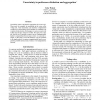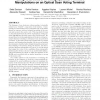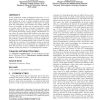205 search results - page 3 / 41 » Elections Can be Manipulated Often |
AAAI
2007
13 years 9 months ago
2007
Uncertainty arises in preference aggregation in several ways. There may, for example, be uncertainty in the votes or the voting rule. Such uncertainty can introduce computational ...
SAC
2009
ACM
13 years 11 months ago
2009
ACM
The firmware of an electronic voting machine is typically treated as a “trusted” component of the system. Consequently, it is misconstrued to be vulnerable only to an insider...
CORR
2006
Springer
13 years 7 months ago
2006
Springer
We study the complexity of influencing elections through bribery: How computationally complex is it for an external actor to determine whether by paying certain voters to change t...
SIGECOM
2010
ACM
13 years 7 months ago
2010
ACM
In the traditional voting manipulation literature, it is assumed that a group of manipulators jointly misrepresent their preferences to get a certain candidate elected, while the ...
MFCS
2009
Springer
13 years 11 months ago
2009
Springer
Abstract. To make a joint decision, agents (or voters) are often required to provide their preferences as linear orders. To determine a winner, the given linear orders can be aggre...



